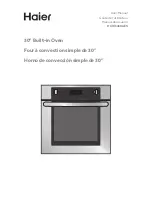
•
Ensure that the appliance is switched off before replacing the
lamp to avoid the possibility of electric shock.
•
Do not use a steam cleaner to clean the appliance.
•
Do not use harsh abrasive cleaners or sharp metal scrapers to
clean the glass door since they can scratch the surface, which
may result in shattering of the glass.
•
If the mains power supply cable is damaged, it must be
replaced by the manufacturer, its Authorised Service Centre or
similarly qualified persons to avoid an electrical hazard.
•
Do not activate the appliance when it is empty. Metal parts
inside the cavity can create electric arcing.
•
Metallic containers for food and beverages are not allowed
during microwave cooking. This requirement is not applicable if
the manufacturer specifies size and shape of metallic
containers suitable for microwave cooking.
•
If the door or door seals are damaged, the appliance must not
be operated until it has been repaired by a qualified person.
•
Only a qualified person can carry out any service or repair
operation that involves the removal of a cover which gives
protection against exposure to microwave energy.
•
Do not heat liquids and other foods in sealed containers. They
are liable to explode.
•
Only use utensils that are suitable for use in microwave ovens.
•
When heating food in plastic or paper containers, keep an eye
on the appliance due to the possibility of ignition.
•
The appliance is intended for heating food and beverages.
Drying of food or clothing and heating of warming pads,
slippers, sponges, damp cloth and similar may lead to risk of
injury, ignition or fire.
•
If smoke is emitted, switch off or unplug the appliance and keep
the door closed in order to stifle any flames.
•
Microwave heating of beverages can result in delayed eruptive
boiling. Care must be taken when handling the container.
•
The contents of feeding bottles and baby food jars shall be
stirred or shaken and the temperature checked before
consumption, in order to avoid burns.
3




































